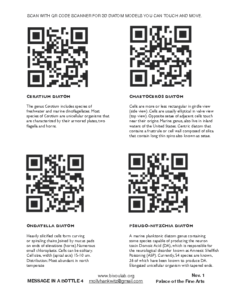Cells are more or less rectangular in girdle view
(side view). Cells are usually elliptical in valve view
(top view). Opposite setae of adjacent cells touch
near their origins. Marine genus, also live in inland
waters of the United States. Centric diatom that
contains a frustrule or cell wall composed of silica
that contain long thin spins also known as setae
Odontella Model
Heavily silicified cells form curving
or spiraling chains Joined by mucus pads
on ends of elevations (horns).Numerous
small chloroplasts. Cells can be solitary.
Cell size, width (apical axis) 15-10 um.
Distribution: Most abundant in north
temperate
Pseudo-nitzschia Model
A marine planktonic diatom genus containing
some species capable of producing the neuron
toxin Domoic Acid (DA), which is responsible for
the neurological disorder known as Amnesic Shellfish
Poisoning (ASP). Currently, 54 species are known,
26 of which have been known to produce DA.
Elongated unicellular organism with tapered ends
Ceratium Model
The genus Ceratium includes species of
freshwater and marine dinoflagellates. Most
species of Ceratium are unicellular organisms that
are characterized by their armored plates, two
flagella and horns.
